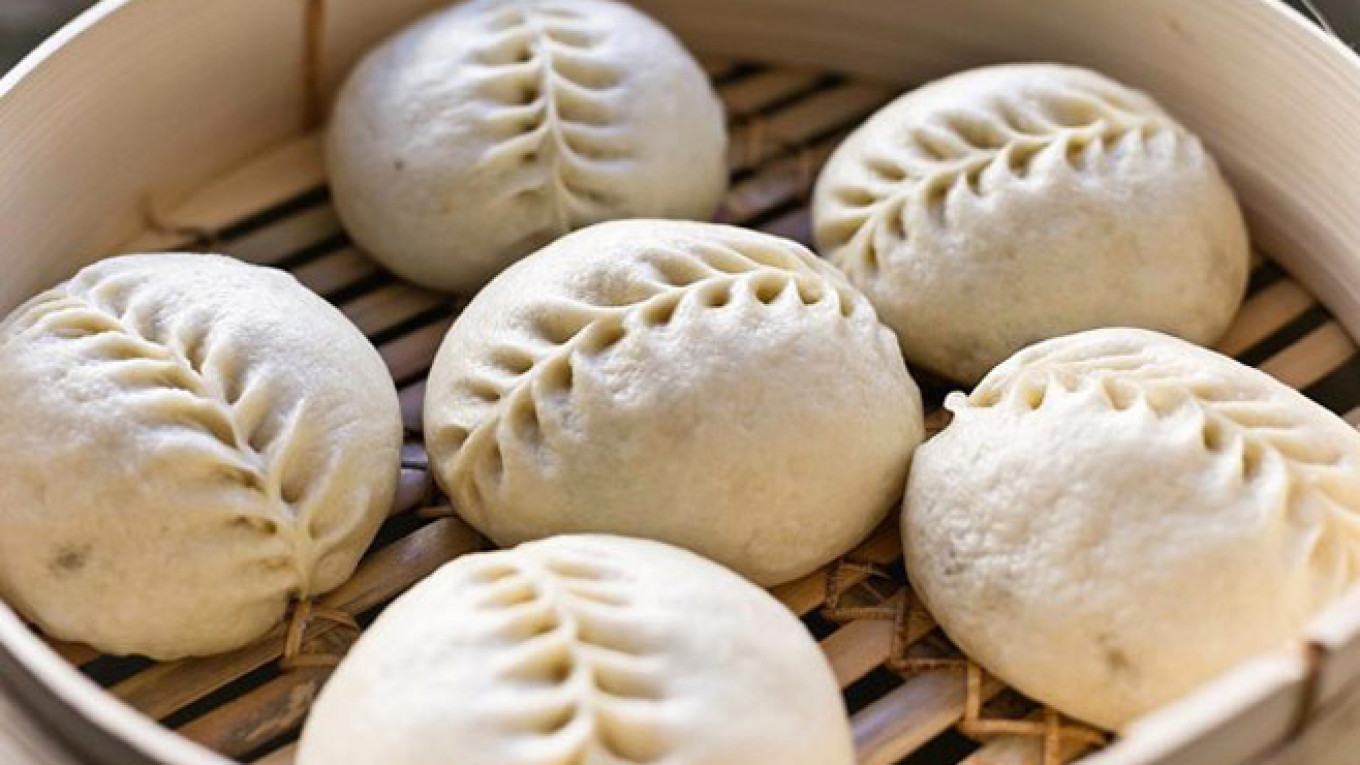The hipster guys who run the counter at the Pyan-Se shop outside Mayakovskaya metro are used to being asked where the hookahs are — the tiny storefront shares a front door with a lounge called ShishaMania — but they're also used to taking every opportunity to sell their Korean-style street food. After being talked into trying a salmon-filled bun, one new customer didn't have any complaints.
"This is better than shisha," she said, walking out the door into the street, away from the hookah shop.
Pyan se — giant steamed buns with various fillings — are a Russianized version of the South Korean wang mandu, or king dumpling. Served in a convenient three-sided envelope, they are meant to be eaten standing up at a counter in a tiny dumpling shop (like the one at Mayakovskaya) or on the way home from work.
The Russian name for the buns, which has no real Korean equivalent, comes from the Korean dialect spoken on Sakhalin, where the buns were first made — in 1994, according to Wikipedia. They quickly spread across the Russian Far East to Vladivostok, where Alexei Semyonushkin, the general director of the Pyan-Se network in Moscow, first encountered them.
Semyonushkin opened the first Moscow Pyan-Se with three other friends from the Far East in 2013, but the business faced some early challenges.
Another of the Pyan-Se founders, Ksenia Malashenok, told Primorskaya Gazeta, the official newspaper of the government of the Primorye region, in January that the company's first cafe was closed down after two weeks. But this was not necessarily because the buns were not popular — Pyan-Se had rented space in a kiosk that was removed at short notice, in a typical move by the Moscow city administration.
Today, however, business is booming.
"We have four locations, at the food court at VDNKh, Sokolniki, at metro Mayakovskaya and on Arbatsky Pereulok. We soon plan to open another location at Bauman Garden," Semyonushkin said.
The company advertises on social media and participates in food festivals to get the word out.
Because of quality control, the buns are all made in one place by chefs trained by experts in pyan se from the Far East, and then delivered to the cafes. The business is still fairly small scale and it's not uncommon to arrive to a Pyan-Se at the end of the day and find several varieties sold out. This is particularly true of the classic pyan se, stuffed with beef, pork and cabbage, which Semyonushkin says is by far the most popular — although, he added, the pyan se with kimchi also has a strong following.
Individuals can also order pyan se for home delivery through the food delivery site Smartomato.ru, but taking advantage of this option almost requires throwing a party — pyan se run from 130 rubles for a vegetarian bun to 190 rubles for one with kimchi, and free delivery is available only for orders over 2,500 rubles.
Contact the author at [email protected]
A Message from The Moscow Times:
Dear readers,
We are facing unprecedented challenges. Russia's Prosecutor General's Office has designated The Moscow Times as an "undesirable" organization, criminalizing our work and putting our staff at risk of prosecution. This follows our earlier unjust labeling as a "foreign agent."
These actions are direct attempts to silence independent journalism in Russia. The authorities claim our work "discredits the decisions of the Russian leadership." We see things differently: we strive to provide accurate, unbiased reporting on Russia.
We, the journalists of The Moscow Times, refuse to be silenced. But to continue our work, we need your help.
Your support, no matter how small, makes a world of difference. If you can, please support us monthly starting from just $2. It's quick to set up, and every contribution makes a significant impact.
By supporting The Moscow Times, you're defending open, independent journalism in the face of repression. Thank you for standing with us.
Remind me later.






